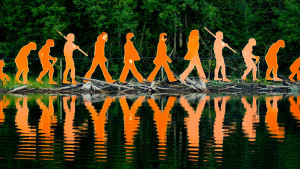It’s bubbly, it tastes like vinegar and in recent years it has been heralded as the wonder-drink that can bring your body back into balance so it can heal itself. While some maintain that kombucha is great for your intestines because it increases the number of beneficial organisms, no medical study yet supports any such health claim.
However, that hasn’t stopped devotees from pushing scoby—mixed cultures of bacteria and yeast that are present during the production of kombucha—on eBay and Facebook “Buy, Sell, Swap” groups. In fact, in 2014, sales of the fermented tea drink were close to $US400 million, with predicted growth rates of 30 per cent per year.
One impetus behind this booming probiotic food industry, including products like kombucha (not to mention remarkable but distasteful sounding genuine medical advances like effective faecal transplant therapy), is the realisation that complex multicellular organisms, including humans, live with an extensive microbiome (a system of microbial organisms) that appears to be essential for their health.
After more than a century of our war against bacteria and other microorganisms, we are finally beginning to realise that most of them are our friends, not our enemies. Without bacteria, we probably could not survive, at least in any state of normal health. This should make the discovery that our bodies contain more nonhuman cells than human cells good news rather than a startling worry.
The discovery of life’s pervasive cooperative interdependence is at odds with the Darwinian view of life as intrinsically at strife—the survival of the fittest. Darwin’s views, how-ever, are reflective of his peers of a Victorian England obsessed with death and suffering. The interest can be traced back to 1833, when the English poet Arthur Henry Hallam died suddenly and unexpectedly. This would be one of those sad but unremarkable facts of history were it not for his close friendship with Lord Alfred Tennyson.
Tennyson spent the next 17 years struggling with the death of his friend. During this time, Tennyson composed In Memoriam, a long poem that wrestles with the shock, sadness and despair he experienced and his search to find meaning from the loss. In cantos 55 and 56, he wrote:
“Are God and Nature then at strife,
That Nature lends such evil dreams?
So careful of the type she seems,
So careless of the single life . . .
‘So careful of the type?’ but no.
From scarped cliff and quarried stone
She cries, ‘A thousand types are gone;
I care for nothing, all shall go’ . . .
Who trusted God was love indeed
And love Creation’s final law
Tho’ Nature, red in tooth and claw
With ravine, shriek’d against his creed”
Anyone who has experienced the loss of a loved one can probably understand some of what Tennyson felt. But is nature really as grim as Tennyson depicts it? Is it intrinsically “red in tooth and claw”? How do scientific claims of a peaceful, cooperative interdependence stack up against biological reality?
A struggle for survival?
Tennyson was not alone in his concern that nature may, at its core, be centred on suffering and death. In fact, the portion of In Memoriam quoted earlier is thought to have been written in response to Robert Chambers’ 1844 book, Vestiges of the Natural History of Creation. Chambers’ book proposed an evolutionary origin of the universe and life 15 years before Darwin’s The Origin of Species was published.
But 1844 was also the year Darwin wrote what is known as his “1844 Sketch,” a brief summary of his ideas about evolution. As a central part of his understanding of nature, Darwin seems to have shared Chambers’ view that older, inferior organisms must be replaced by more advanced ones.
It’s clear from Darwin’s later writings that his perspective led him to view all of nature, including humans, as pitted against one another in a struggle for survival, one in which “less civilised races” must inevitably be wiped out.
The Bible has a more optimistic view. The apostle Paul stressed that in Christ there is no difference in value between people, whatever their race or social status: “There is neither Jew nor Gentile, slave nor free, male nor female, for you are all one in Christ Jesus (Galatians 3:28).
Beautiful but marred
It’s an oversimplification to say that Darwin’s view was exclusively depressing and the biblical one nothing but joy and light. After all, at the end of The Origin of Species, Darwin wrote about the wonder that’s present in nature, with particular reference to the amazing interrelationships between organisms, and optimistically proposed that progress through evolution will lead to organisms more perfect than we may even have now. The Bible, on the other hand, talks about suffering in nature. For example, Paul observed that, “The whole creation has been groaning as in the pains of childbirth right up to the present time” (Romans 8:22).
So is creation really dominated by competition, struggle and suffering? Are these the defining principles that result in the occasional beauty that we see? This was Darwin’s view: “From the war of nature, from famine and death, the most exalted object which we are capable of conceiving, namely, the production of the higher animals, directly follows.”
However, the biblical view states that creation was—and still is—wonderful but marred by sin. In other words, the goodness that God created is there, at least in part, and it’s necessary for life, while the suffering and death we witness are impositions on what was initially “very good” (Genesis 1:31). Paul, in anticipation of the new creation promised by Jesus, said that “the creation itself will be liberated from its bondage to decay and brought into the glorious freedom of the children of God” (Romans 8:21).
The Bible addresses both evil and good, providing an explanation of both. There’s no compulsion to see only peaceful cooperation in nature or only struggle.
Cooperating to live
However, it’s fairly obvious that life probably could not exist—at least as we know it—if all species, or all individuals within a species, were at war with each other for survival. In other words, life is not “a kingdom divided against itself,” which Jesus Himself noted could not stand (Matthew 12:25). And this is where we begin to see scientific discoveries consistent with biblical claims.
While all organisms ultimately die, there are surprisingly few pathogenic bacteria and predators. This is especially true relative to the vast systems of cooperation we see between organisms. For example, plants don’t seem to be at war with the fungi they live with. In fact, both organisms benefit when fungi amplify the surface area of roots, providing water, minerals and protection to the plant, which in exchange, gives sugar to the fungi.
On a grand scale, ecological cycles tend to illustrate the division of work in nature that makes cooperation an essential element. In the nitrogen cycle, different organisms perform different steps.
Amazingly, each of the organisms involved—and there are many of them—benefits in some way from its role, while at the same time being dependent on the other organisms in the cycle and providing benefits to organisms that are less directly involved. In fact, without the nitrogen cycle, life as we know it appears to be impossible. From the nitrogen cycle’s grand scale all the way down to human intestines, organisms depend on one another and could not exist without beautifully elegant, cooperative relationships, irrespective of whether or not kombucha helps.
Both Bible-believing Christians and Darwinists should be able to see the beautiful, cooperative relationships that pervade nature. This is what makes the suffering that we do observe in nature so startling. Death and suffering are not the cruel tools of progress; they are the unfortunate consequences of sin that Jesus Christ, the Creator God, has paid the price to overcome. Vestiges are still evident today of the beauty that pervaded God’s “very good” creation and these provide good reason to look forward to His promised new creation (Revelation 21:5).
Ultimately, in a poem titled “Love,” Tennyson himself, through the eyes of faith, grasped the hope that God’s Word gives to all of us who live in a world where we understand so little, and where suffering is truly an evil in which we find no meaning:
“Thou, from the first, unborn, undying love,
Albeit we gaze not on thy glories near,
Before the face of God didst breathe and move,
Though night and pain and ruin and death reign here.”
When the next wonder probiotic appears, it should remind us that we are still discovering how “fearfully and wonderfully made” we are. When these new elixirs fail to live up to the hype of perfect peace and health, let’s not forget how amazing life is. In the face of suffering, let us understand that the same Creator God who made all the wonders we see, all the beauty we enjoy and all the remarkably intricate biological systems that allow life to thrive, promises a “new creation.”
Now that’s something worth looking forward to!





